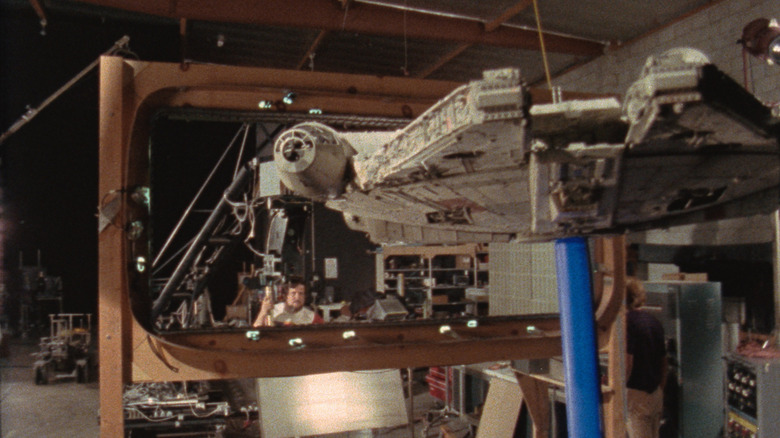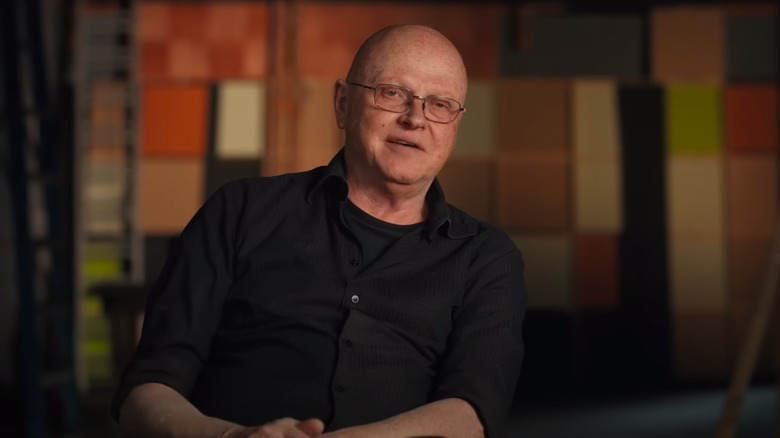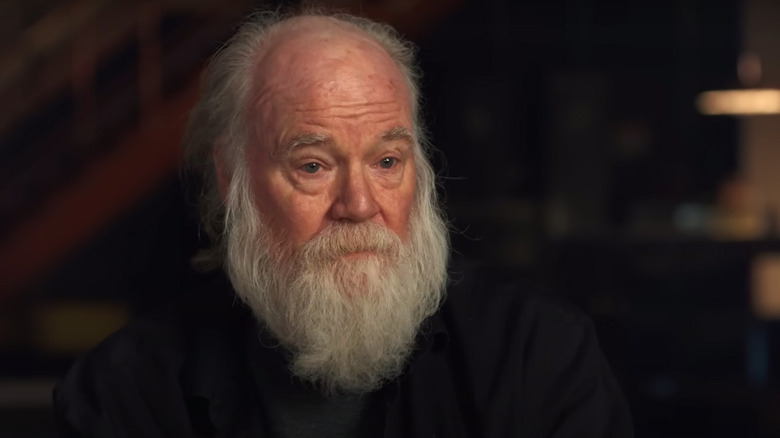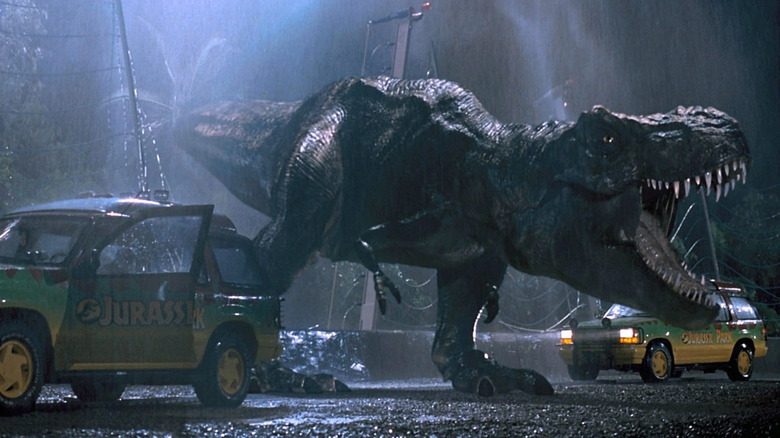VFX Legends Dennis Muren And Phil Tippett On The State Of Modern VFX, What Movies Impressed Them & More [Interview]
Blockbuster filmmakers get all the glory when a movie becomes a hit and instantly lands a place in pop culture history. But films like "Star Wars," "Terminator 2: Judgment Day," "Jurassic Park," "E.T. The Extra-Terrestrial," and more wouldn't have been possible without visual effects masters like Dennis Muren and Phil Tippett. Spaceships, robots, aliens, dinosaurs, monsters, bugs, and more have all graced the big screen in generation-defining motion pictures thanks to the artistry of these two legends.
The innovative and breathtaking work of Muren and Tippett is chronicled extensively in the new six-part documentary series "Light & Magic," which is now available on Disney+. Focusing on the visual effects house Industrial Light & Magic, the series chronicles the rise of pure movie magic. Leading up to the show's release, we spoke with Muren and Tippett about looking back at ILM's history, the state of modern visual effects, and which recent films have impressed them with VFX spectacle.
'I was impressed with the new Top Gun movie'
Have you guys actually watched the documentary series yet?
Tippett: Yeah, all of it.
Muren: I haven't.
I was wondering if there was anything that you two learned about Industrial Light & Magic that you otherwise weren't aware of despite working there for so long?
Tippett: Well for me, definitely, because I wasn't at ILM. Most of the work that we did was offsite. John Berg and I, we just came in at the very end. So all of the stuff with all the motion control stuff, Dennis and Ken were on the night crew, and I'd go in and visit them. But I had no idea the enormous leap that [John] Dykstra brought to the whole filmmaking process.
Yeah, it's fantastic. How do you guys feel about the use of VFX in blockbuster movies today? Is there any feeling that some of them rely too much on VFX spectacle as a crutch these days?
Tippett: Dennis, what was the last movie that you remember the visual effects spectacle? I thought the work has gotten much better the last year or two, but can you think of a movie that impressed you the most?
Muren: A regular movie or an effects film?
Tippett: Yeah, an effects film.
Muren: I was impressed with the new "Top Gun" movie. I was also impressed with the [most recent] "Jurassic Park" film, and some of the ones I've seen before that have not impressed me as much. I don't know if things have gotten better, or what's going on, if people are learning, or the filmmaking process is getting more — and when I say better, I'm talking about more realistic, which is a whole discussion. It doesn't mean that it's creative in creatures or anything like that. But I think I'm seeing things improving. It could be that finally this generation has had a chance to work together. I don't know what it is. I couldn't tell you. I've sort of retired. So I'm watching it from the outside.
How about you, Phil? What have you been impressed by?
Tippett: I was reading an interview with [director Martin] Scorsese a year or so back, and he was bemoaning all of this bulls**t content, which is like content meets hot air, really. So he was moaning about that, and they asked him what was the last movie that you found memorable? This from a couple years ago, and he said "Gravity" was the last one. And I thought, "You know what? You're right." That's the last one I can remember that was just this huge ... I mean, the format that they used and the 3D and everything was just so immersive. It really put spectacle in capital letters across it. Because I don't watch the other things. I don't care about Tom Cruise or the 14th "Jurassic Park," or Marvel movies, so yeah.
'The less you see, the more you create a monster in your own mind'
Do you feel like there are too many movies that use VFX as a way to maybe cover up stories that perhaps aren't necessarily as polished as they need to be?
Muren: Maybe. I don't know what you mean by polished. You could say yes, they're more energetic. There's more complexity to the dangers or whatever. They may not be quite as emotional for as long a screen time as other films are, but there's a lot of emotion in a lot of those movies, too. Also they're just quick. I don't know, I'm not bothered by it. I am bothered by the overuse, I think, of destruction and stuff like that. You just see too many shots. I'm an old school, where I think a lot of it is the buildup and the reality of the moments, if you see it, to more mirror our real life. I think that's the stuff that is intriguing to me.
Tippett: The whole less is more thing, [that's what] I ascribe to. The horror movies from the '50s and '60s would always put the monster spectacle, blowing up the world, in the third act, and everything would lead up to it. And so in "Jurassic Park," what do we have, Dennis, like 55 CG shots?
Muren: Yeah.
Tippett: Something like that, yeah. And then the shark didn't work in "Jaws," the alien didn't work in "Alien." So it really puts the onus on the director. I learned a valuable lesson from those things: The less you see, the more you create a monster in your own mind. And that's where monsters belong, is in your unconscious. So that was a big revelation to me.
'So where the magic comes from is making it hyper-real'
What is it about VFX in movies like "Jurassic Park" or even "Starship Troopers" that have stood the test of time and still look great today, sometimes even better than VFX that were created last year? What is it that makes those still look so great after all these years?
Tippett: I think the artistry, the people that were involved with it like me and Dennis. One thing that we've talked about, Dennis and I, is that you don't necessarily try to make things real. I mean, you do, but you can't. So where the magic comes from is making it hyper-real, which is what it is anyhow. I think that's really where you get the spectacle quotient.
Muren: And that's where your imagination is also. Your imagination adds to it. And the director is making everything kind of hyper-real, hyper-clear. And the cameraman's doing it. Everybody's got their job. You've got to remember the show and how you're going to help tell the story. It's not just with throwing stuff in. I mean, you can. With 2,000 shots and so many of these shows that are making $300 million, it's hard to argue with that. So there's an audience for that. But you can also do it. It's much harder to find an audience for ones that are more streamlined with less work in it and more emotional buildup. Although those films are still being done, too. A movie for everybody.
Do either of you have a white whale visual effect from your career, something that you attempted that maybe you just couldn't pull off for whatever reason that has always bugged you?
Muren: No.
[Laughs] You guys just always did it.
Tippett: I have some and they're going to remain in the ocean.
"Light & Magic" is streaming now on Disney+.



